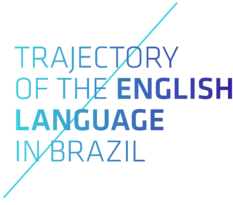About the history of English language teaching in Brazil
It is with pleasure that we present our version of the timeline with a snapshot of the trajectories of the English language in Brazil. The perspective is not just chronological. The narrative presented here seeks to understand the presence of the English language in Brazil from a broader and more inclusive perspective, and not restricted to a Eurocentric view of history. This is a complex and vast subject, difficult to cover entirely in a timeline, and could therefore contain gaps due to the editorial choices of the project. Our intention is to contribute to knowledge and provide an overview of the trajectories that the English language has taken in Brazil in the last 200 years and, thus, stimulate deeper reflections on the subject in other debate forums, be they in or outside the classroom.
The English language is not only seen as the language to be learned, but also within a social context influenced by the process of colonisation and oppression. There is an intention in this project to approach English as an “additional language” and not a “foreign language”, a perspective that also adopts this format of resistance of cultures against oppression.
Language is a powerful tool that can be used to perpetuate or combat oppressive social relationships. A bridge for the emancipation of knowledge and cultural interaction between peoples, which makes it necessary to understand the presence of the English language in Brazil. A broad approach to the voices of social groups that have been historically oppressed and made invisible is fundamental for a more conscious and profound reflection on the subject. Women who were black, who were LGBTQIA+, disabled and other minority groups were also, and are part of this trajectory and were included in this brief timeline.
From a historical perspective, the timeline seeks to approach the presence of the English language in Brazil from its official arrival, through different moments in history, to the present day. We will see how the English language has developed in the country, from its introduction as a relevant language in Brazil and the world, to its role as a lingua franca. Teaching methodologies, characters, legislative changes, the birth of institutions and teaching materials, among other historical facts, are presented. Documentary research was carried out with the collaboration of the British Council’s network of specialists, but there is no in-depth analysis of the subject due to the chosen editorial line seeking a wider audience.
The project still advances in the historical line and connects the reality of the past with the transformations of the present. Interviews were carried out with teachers, specialists and young students with the aim of providing an updated and critical perception about the results of centuries of inequality and racism in the country, and how these processes relate today to the teaching of English, whether in primary education or teacher training at university.
It is important to note that the timeline is not intended to provide a conclusive view on the subject. It is simply a starting point for a reflection on the history of the English language, aimed at teachers and students of the language. Despite the journalistic verification and reliable sources used in its construction, it should not be confused with an academic paper. Finally, it is important to remember that many stories have been erased or forgotten, which could result in a lack of historical accuracy.






